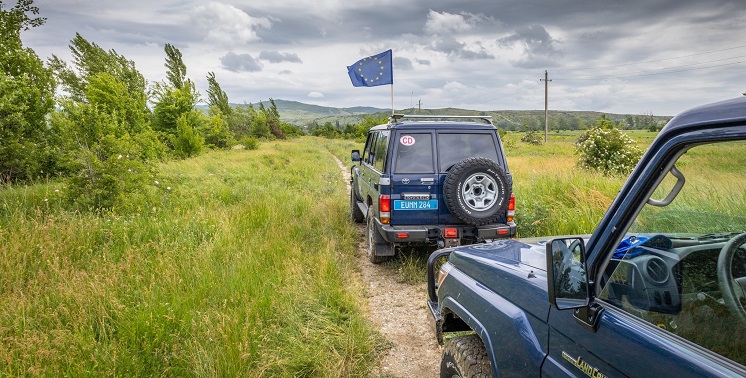EUMM Georgia head highlights “long-lasting consequences” of conflicts in Russia-Georgia war anniversary message

EUMM Georgia is the only international mission observing developments adjacent to the occupied regions, but is denied access to Abkhazia and Tskhinvali by de facto authorities in the regions. Photo: EUMM Georgia press office
Dimitrios Karabalis, the head of the European Union Monitoring Mission in Georgia, on Tuesday responded to the 15th anniversary of the Russia-Georgia 2008 war by saying “consequences of armed conflicts are long-lasting, and the road to reconciliation and recovery can be challenging”.
Paying tribute to “all those affected by the war”, Karabalis expressed his “unwavering support” for all efforts to find “lasting solutions” that could benefit the conflict-affected communities.
Reiterating the Mission’s dedication to “fostering stability, peace, and security in the [South Caucasus] region, and pledging its “constant presence” along the Administrative Boundary Lines separating Russian-occupied regions of Abkhazia and Tskhinvali (South Ossetia) from the rest of Georgia, the official also highlighted the Mission’s efforts for confidence-building for the affected communities.
Statement by @EUMMGeorgia_HoM Dimitrios Karabalis on the 15th Anniversary of the War between Russia and Georgia.
— EU Monitoring Mission in Georgia (@EUMMGeorgia) August 8, 2023
ENG ???? https://t.co/YPhk3ksNXZ
GEO ???? https://t.co/GaaVXXlKqJ
RU ???? https://t.co/xsxp4w8OSq@eu_eeas @EUSec_Defence pic.twitter.com/TjfrBcHYJP
We remain steadfast in our commitment to create a conducive environment for a peaceful solution to the conflict”, he added.
EUMM Georgia was deployed in September 2008, following an EU-mediated ceasefire which ended the war in August of that year, to contribute to “stabilisation, normalisation and confidence-building between the conflict parties”. It is the only international mission observing developments adjacent to the occupied regions, but is denied access to Abkhazia and Tskhinvali by de facto authorities in the regions.
Headquartered in Tbilisi, the mission has field offices in the central Georgian city of Gori - near occupied Tskhinvali - as well as the central-eastern city of Mtskheta and Zugdidi in the west of the country, near occupied Abkhazia.
 Tweet
Tweet  Share
Share